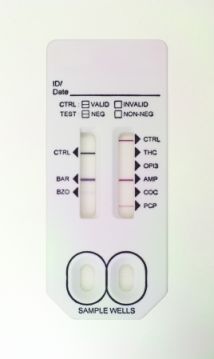WORKPLACE RANDOM DRUG TESTING
Random Drug Testing
Many of those opposed to workplace random drug testing insist it doesn't prove the employee can't do the job. If the test is positive all it proves is the employee may have used the drug tested for sometime in the past.
Random drug testing programs began in 1986 when Ronald Reagan signed into law Executive
Order 12564 intended to create a drug free workplace. All federal workers as a condition of employment became exposed to a drug and random test designed to eliminate illegal drug use on and off the job.
Hello my name is Yancey, and like many others I don’t deny that drug abuse is a major problem in society. As an employee I have been subjected to pre employment drug testing and I'm against random drug testing. A random drug testing policy in the workplace violates an employees right to privacy according to organizations like the American Civil Liberties Union (ACLU). Follow this link to learn more about employee workplace privacy issues.
Since there are no U.S. government guidelines dealing with workplace privacy laws, many employers will abuse and invade the employee’s privacy. There are specific federal rules involving drug test collection, however there is no uniform random drug testing law.
workplace random drug testing
Employees are usually required to take a random drug test within about 3 hours of being told. Even though drug and random testing has become routine in the workplace, they are still considered an invasion of employee privacy.
When employees submit to random drug testing in public sector settings the urine sample they provide reveals more than just recent drug use.
A random drug test by urine testing provides employers and potential employers with info about other medical issues that have nothing to do with random drug testing an employee or potential employee. These can reveal the existence of things like…

- prior or existing medical conditions
- being prone to certain diseases
- pregnancy
- genetic conditions
Imagine how embarrassing it could be to have it revealed that a potential employee or employee is pregnant without her knowledge or consent.
There is also the concern about errors that take place in the lab results of random drug testing reports.
Research shows that up to 5 percent of drug testing in the workplace produces a false positive result.
Many experts believe the percent of errors is actually higher. That means at least 5 percent of job seekers and employees are denied or lose their jobs unjustly.
workplace random drug testing
Many businesses and organizations have another individual to observe the job seeker or employee to guarantee the sample is not tampered with. But this practice can be very humiliating and degrading. Usually the person providing the random drug test at work has to take off their top clothes and pee in a restroom where the water has been cut off.
Here is an example of what you or any one else can and may be subjected to as part of random employee drug testing.
“ I waited for the attendant to turn her back before pulling down my pants, but she told me she had to watch everything I did. I am a 40 year old mother of three: nothing I have ever done in my life equals or deserves the humiliation, degradation and mortification I felt.”
-From the (ACLU) American Civil Liberties Union describing a workplace drug test.

Under random drug testing law the employer may have “good cause” to not hire, deny promotion and fire you.
If an employee is fired for failing a drug test or is injured on the job and tests positive, she may be denied disability benefits, workers compensation or unemployment. This depends on the employers policy and your local and
state drug testing laws.
Employees and job seekers can be put between a rock and a hard place when it comes to workplace random drug testing.
You have the right not to agree to a drug test. However, since the system says you are guilty until proven innocent employers may treat that as failing a workplace random drug test. This means they may be justified in firing or not hiring you.
workplace random drug testing
There is some good news when it comes to not passing or …
passing a random drug test
Job applicants and employees have won lawsuits on various random drug testing cases. Cases have been won even when they did not pass a random drug test. Again, employees and job seekers should learn what their local and state drug testing laws are because some employers violate those laws.
Random drug and alcohol testing laws are different from state to state but here are some questions job seekers and employees should ask. Does the local or state law…

- ban workplace random drug testing?
- allow employers to require job applicants and employees to pay for drug test?
- allow drug testing for security and public safety positions only?
- set boundaries on the consequences for employees that pass any random drug test?
On the other hand job applicants and employees have come up short in lawsuits against drug and random testing.
If you fail or decline being drug tested that creates a negative situation for you,
legal advice from an employment law attorney is your best option.
My new sites provides the
MOST current changes affecting career seekers and employees. Some employers are constantly working to take away the rights of employees. Follow this link to
EMPLOYEE RIGHTS GUIDE and
EMPLOYEE WORKPLACE RIGHTS for the latest employee news you can use!
What matters to me...is to help my fellow employee!
Return from Workplace random drug testing to Employment Drug Testing
HOME
Enjoy this page? Please pay it forward. Here's how...
Would you prefer to share this page with others by linking to it?
- Click on the HTML link code below.
- Copy and paste it, adding a note of your own, into your blog, a Web page, forums, a blog comment,
your Facebook account, or anywhere that someone would find this page valuable.








 Under random drug testing law the employer may have “good cause” to not hire, deny promotion and fire you.
Under random drug testing law the employer may have “good cause” to not hire, deny promotion and fire you. 


